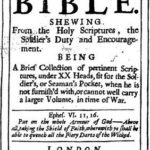We run our website the way we wished the whole internet worked: we provide high quality original content with no ads. We are funded solely by your direct support. Please consider supporting this project.

Jesus, the Word of God
“[T]he standing message of the Fathers to the Church Universal,” writes Georges Florovsky, was that “Christ Jesus is the Alpha and Omega of the Scriptures both the climax and the knot of the Bible.”[1] It was also unquestionably one of the most foundational theological assumptions of Luther and Calvin as well as other Reformers. Hence, for example, Luther argued that, “the function of all interpretation is to find Christ.”[2] In contrast to the so-called “objective” historical-critical approach, certain advocates of the Theological Interpretation of Scripture movement are exploring what it means to affirm that “… all texts in the whole Bible bear a discernible relationship to Christ and are primarily intended as a testimony to Christ,” as Graeme Goldsworthy put it.[3] Hence, “The prime question to put to every text is about how it testifies to Jesus?”[4]
We might say that Jesus is “the Word” of the words. T.F. Torrance succinctly captures the Christocentric focus both of a proper understanding of inspiration and of hermeneutics when he writes:
Since the Scriptures are the result of the inspiration of the Holy Spirit by the will of the Father through Jesus Christ, and since the Word of God who speaks through all the Scriptures became incarnate in Jesus Christ, it is Jesus Christ himself who must constitute the controlling centre in all right interpretation of the Scriptures.[5]
We might view the relationship between the diverse words of Scripture and God’s one and only Incarnate Word by comparing it to the way syllables and letters relate to words we utter or write. Just as syllables and letters find their function in forming the words we utter or write, so the diverse words of Scripture find their sole function in uttering the name “Jesus.” Vern Poythress comes close to this perspective when he states: “The Bible contains many distinct truths in the distinct assertions of its distinct verses.” Yet, in light of the fact that Jesus presented himself as the truth, Poythress adds, “all these cohere in the One who is truth.”[6]
Scott Swain reflects this view when he notes that, while God speaks in a wide diversity of ways throughout the progress of revelation, “ultimately God speaks the same Word … the word Christ.”[7] He continues, “God communicates his Incarnate Word (Jesus Christ) through his inscribed Word (Holy Scripture) for the sake of covenantal communication and communion.”[8]
In this light, we might say that Jesus is thus the truth of all truths, the Word that is spoken in all true words, and the revelation in all that is revelatory in Scripture. Despite its remarkable diversity, when read through the lens of Christ, as Hugh of St. Victor expressed it, “the whole of scripture is one book, and that one book is Christ.”
[1] G. Florovsky, Aspects of Church History, Vol.IV (Belmont, Mass: Nordland Pub. Co., 1975), 38
[2] Dockery, “Christological Hermeneutics,” 191. F.W. Farrar, History of Interpretation (London: Macmillan, 1886), 232.
[3] Goldsworthy, Gospel-Centered Hermeneutics, 252; cf. idem, Preaching the Whole Bible, 21. For an excellent defense of a Christocentric approach to Scripture that is oriented toward its practical significance, see Smith, Bible Made Impossible, 93-126.
[4] Goldsworthy, Gospel-Centered Hermeneutics, 252; cf. idem, Preaching the Whole Bible, 21.
[5] T. F. Torrance, The Trinitarian Faith: The Evangelical Theology of the Ancient Catholic Faith (Edinburgh: Clark, 1988), 39.
[6] V. Poythress, God-Centered Biblical Interpretation (Pillipsburg, NJ, 1999), 58.
[7] S. Swain, Trinity, Revelation and Reading: A Theological Introduction to the Bible and Its Interpretation (New York: T & T Clark, 2011), 25. See ibid., 37.
[8] Swain, ibid., 60.
Photo credit: Leo Reynolds via Visualhunt / CC BY-NC-SA
Category: General
Tags: Bible Interpretation, Cruciform Theology, Jesus
Topics: Biblical Interpretation
Related Reading

Jesus and Nationalistic Violence
Throughout the Old Testament, we find Israel spoken of as God’s “chosen nation.” The Israelites were to be a nation of priests whom God wanted to use to unite the world under him (Ex 19:6). Since nationalism and violence inevitably go hand in hand, as Jacque Ellul and others have noted, the covenant God made…

What to Do If You See God as Violent
God really is as beautiful as he is revealed to be on Calvary. Communicating this is my goal in everything I write—especially Crucifixion of the Warrior God and Cross Vision. But for many, to see him as being that loving, is not easy. We have to make a concerted effort for our brains to adjust…

Seeing and Knowing God
There are many scripture passages that seem to suggest that the way people view God often says more about them than it does about God. Our perception of God, as well as other spiritual truths, is conditioned by the state of our heart. Jesus’ most important teaching on this matter is found in John’s Gospel…

Podcast: How Does God’s Wrath Fit within a Cruciform Theology?
Greg considers God’s wrath. http://traffic.libsyn.com/askgregboyd/Episode_0390.mp3

Did God Kill King Saul?
When we approach Scripture with the assumption that it is all God-breathed for the purpose of bearing witness to Christ, even the most trivial contradictions in Scripture can acquire theological significance. This is what I argue in Cross Vision. Here I want to illustrate this by briefly discussing the theological significance of a curious discrepancy…

One Hope
When Jesus was crucified by his enemies instead of conquering his enemies, the hope of Jesus’ disciples came crashing down in utter despair. They had hoped that Jesus would establish the kingdom of God in the same way that other kingdoms were established. However, the resurrection reveals that the kingdom of God is not like…
